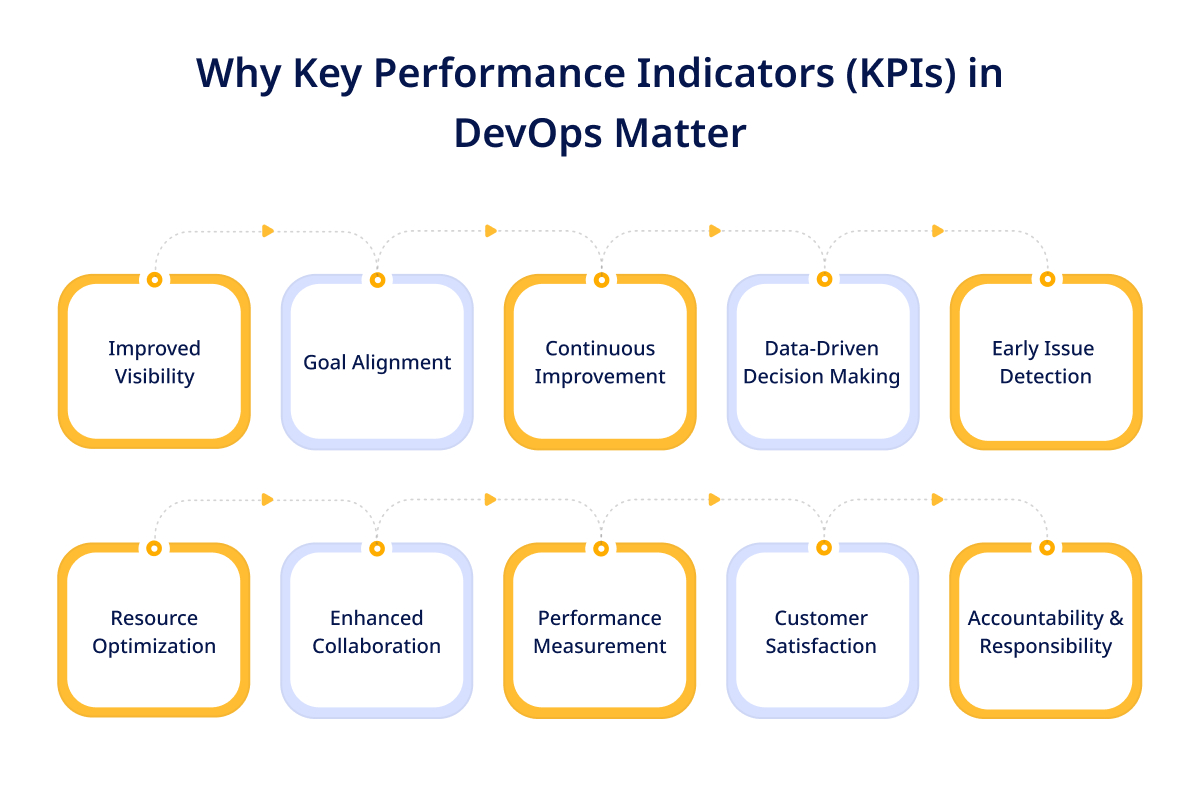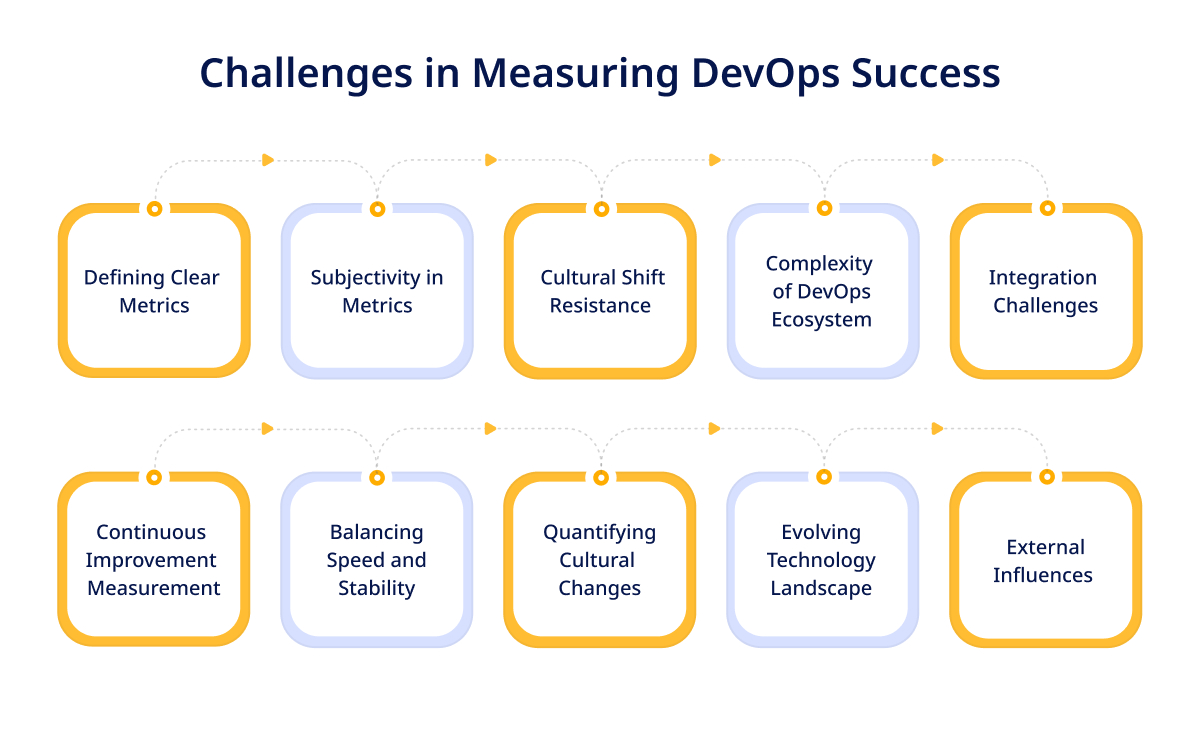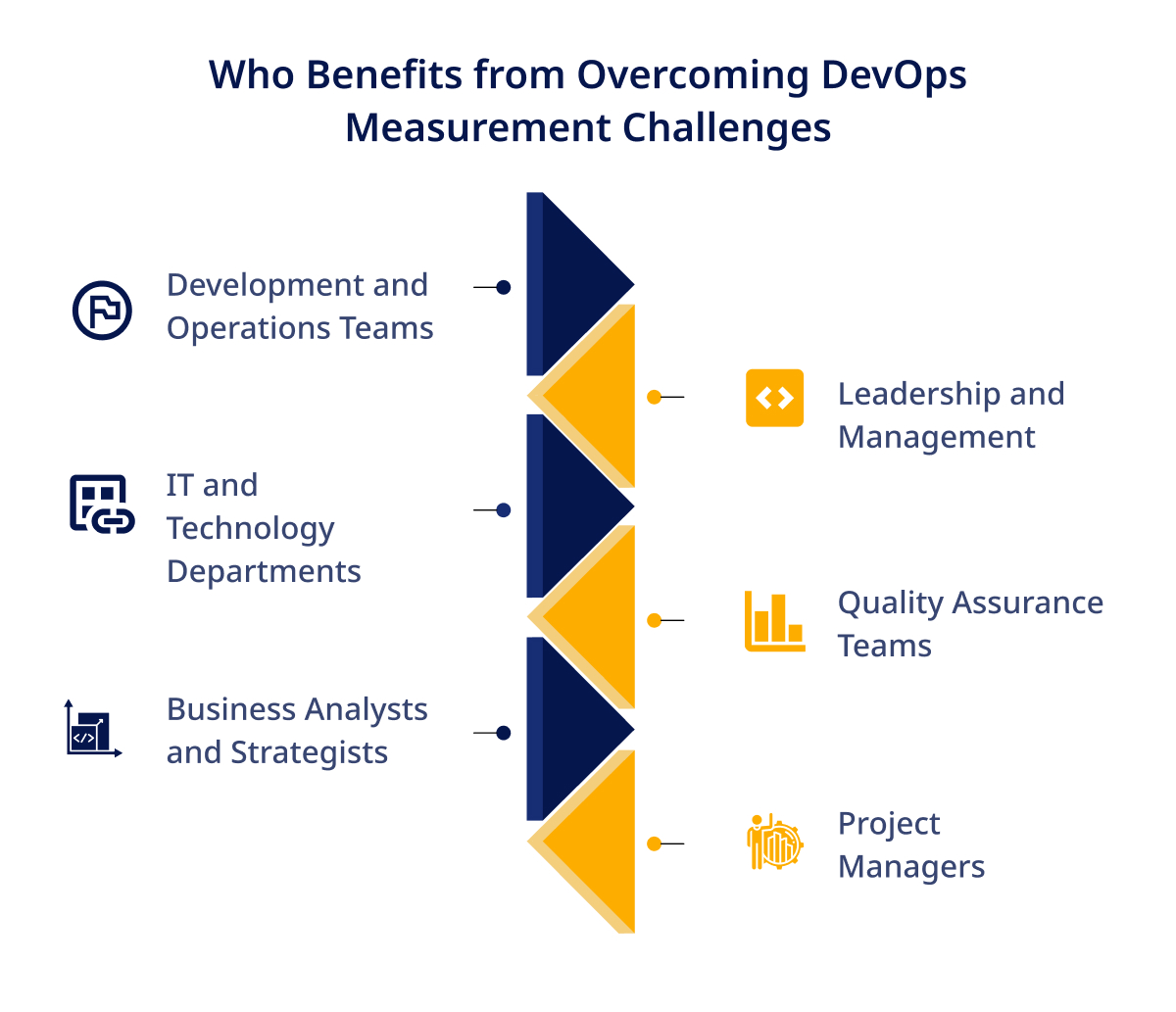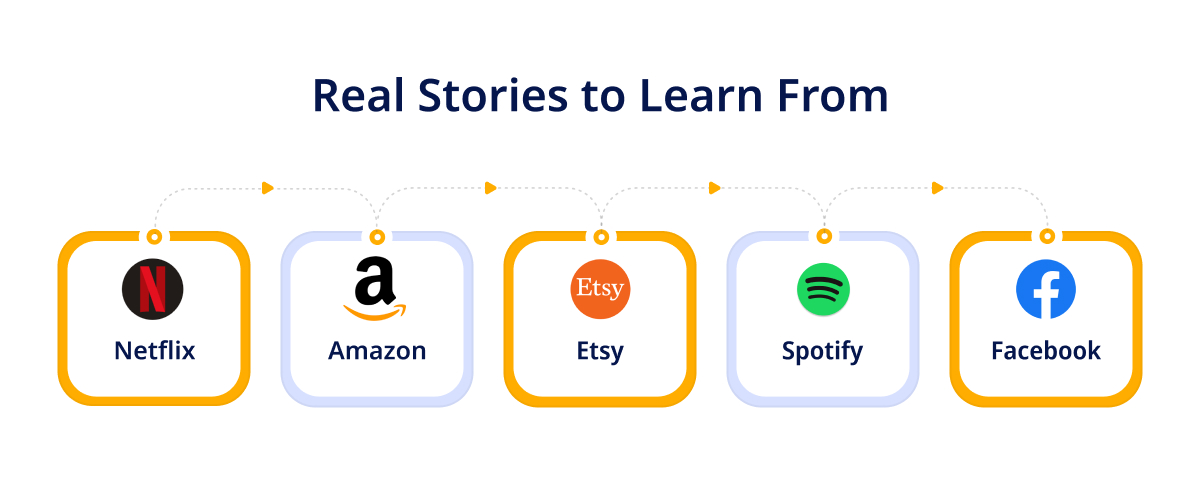Many organizations need help quantifying DevOps’ impact beyond vague productivity and quality claims.
But hard metrics matter, especially when justifying lengthy transformations.
According to recent McKinsey research, 70% of DevOps initiatives fail to realize anticipated benefits due to misalignment and poor measurement.
In this blog post, we will provide a practical framework for defining, tracking, and evaluating metrics demonstrating the tangible impacts of your DevOps efforts.
By consistently measuring outcomes and impacts through relevant DevOps metrics, you can make data-driven decisions, achieve buy-in, and ultimately realize the full benefits that modern software delivery capabilities can yield.
This metrics-driven approach is critical for running DevOps initiatives to efficiently run programs, not just one-off projects.
By the end, you will be equipped with a scorecard to demonstrate the tangible business value your DevOps investment accrues over the short and long term.
Let’s unlock the secrets high-performance organizations rely on to catalyze transformations with hard value.
Significant Numbers and Goals
Understanding your DevOps journey’s critical numbers and goals is like having a roadmap for success.
Let’s break it down in simple terms:
What Are Metrics and KPIs?
Metrics and Key Performance Indicators (KPIs) are like the scorecard of your DevOps game. They help you measure your performance and guide you toward success. If you opt for Cloud Application Development services for your business, these KPIs will help you track the improvements.
Why Do They Matter in DevOps?
- Make the Right Decision: Metrics help make the right decisions when you hire DevOps engineers. It’s like finding the perfect player for your team.
- DevOps Consulting Services: When seeking expert advice, metrics act as your language. DevOps consulting services help you communicate your challenges clearly and get tailored solutions.
- DevOps Success Metrics: These are your success milestones. Metrics show you where you are in your journey and how far you’ve come.
- DevOps Performance Metrics: Just like checking the speedometer in your car, performance metrics tell you how fast and efficiently you’re moving.
- Tracking DevOps Progress: Metrics are like your GPS, keeping you on track and showing if you need to make any detours.
- Measuring DevOps Achievements: Celebrate your victories! Metrics help you see the wins, both big and small.
Why It Matters for Your DevOps Team
- Daily Operations: For your team, metrics are like a daily health check. They keep everything running smoothly.
- Smart Choices: Managers and leaders use metrics to make informed decisions, much like a coach strategizing based on the team’s performance.
- Business Impact: For business stakeholders, metrics translate DevOps’ success into business language. It’s the ROI of your efforts.
- Cultural Shift: Those driving cultural change use metrics as proof of progress. It’s like seeing the culture evolve in real numbers.
In a nutshell, metrics and goals are the languages of success in DevOps, and each software development company should implement this in their project.
Explore how ValueCoders' expertise can optimize your DevOps strategy.
DevOps Success Metrics
Evaluating the progress of your DevOps journey involves measuring success through key metrics.
These metrics provide a tangible way to assess how well your organization is adopting and benefiting from DevOps practices.
Let’s delve into some proven DevOps success metrics:
- Deployment Frequency: How often are code changes deployed to production? High deployment frequency indicates agility and efficiency.
- Lead Time for Changes: The time it takes to implement a change, from code to commit to deployment. Short lead times signify a streamlined development process.
- Change Failure Rate: The percentage of changes that fail. Low failure rates indicate stability and reliability in the deployment process.
- Time to Recover: How quickly can the system recover from a failure? Swift recovery minimizes downtime and impact on users.
- DevOps Performance Metrics: Comprehensive metrics encompassing deployment frequency, lead time, change failure rate, and recovery time. Provides a holistic view of DevOps effectiveness.
- Cloud Application Development Services Utilization: The extent to which cloud services are employed in application development. Highlights the embrace of cloud-native practices.
- Measuring Agility in DevOps: Assessing the ability to quickly respond and adapt to changes. Agile organizations navigate uncertainties efficiently.
- Utilization of Cloud Computing Services: The extent to which cloud resources are leveraged for computing needs. Cloud computing services enhance scalability, cost-efficiency, and accessibility.
- User Satisfaction: The level of satisfaction among end-users. High user satisfaction reflects the successful deployment of features without disruptions.
- Collaboration Across Teams: The degree of collaboration between development and operations teams. Strong collaboration fosters a culture of shared responsibility. This will ensure the best use of top Open Source DevOps tools to create a seamless application.
With the support of Startup Product Development services or Enterprise software development services, businesses can implement and ensure these metrics to their project.
ValueCoders' DevOps strategic support ensures your metrics drive measurable results.
Challenges in Measuring DevOps Success
To measure DevOps success, some challenges can feel like detours on the road to achievement.
Let’s look at these hurdles in simple terms:
1. Teams Struggling to Work Together
DevOps is a team sport, but different players (departments) sometimes struggle to sync up.
Impact on Success: Like a relay race, if the baton (information) doesn’t smoothly pass between teams, it can slow down the entire race.
2. Automation: Not Always Easy
Automation is like having a personal assistant, but sometimes, it needs to be clarified for your requests.
Solving Them: It’s about fine-tuning your assistant (automation tools) to understand your needs better, making your work smoother.
3. Changing Company Culture
DevOps is not just about tools; it’s a cultural shift. Changing culture is like teaching a team a new dance; it takes time and practice.
Dealing with Cultural Issues: Overcoming resistance is like convincing your dance partner to try a new step—they might hesitate at first, but with time, they might enjoy the rhythm.
4. Not Enough Numbers
It’s like sailing without a compass and the right metrics. You might move, but you must find out if you’re heading in the right direction.
Finding the Right Metrics: It’s akin to finding your GPS for DevOps. Once you have the right metrics, you’re on a clear path to success.
To overcome these challenges, consider having some experts in your team. Hire top DevOps engineers from India to get the best services at reasonable costs.
Who Benefits from Overcoming These Challenges?
- DevOps Workers: Overcoming these challenges ensures smoother daily operations, like ensuring everyone in the orchestra plays harmoniously.
- Managers and Leaders: It’s about using metrics to make informed decisions, much like a coach strategizing based on the team’s performance.
- Business People: Metrics translate DevOps success in business language, showing the return on investment in clear terms.
- Those Making Culture Changes: Overcoming challenges is proof of progress in cultural shifts, like witnessing the dance floor embrace new moves.
Tackling these challenges head-on ensures a smoother DevOps journey, helping you hire the right DevOps engineers, leverage DevOps consulting services effectively, and measure your achievements accurately.
It’s the key to a prosperous and harmonious DevOps performance.
Explore how ValueCoders' tailored solutions can redefine your DevOps success.
Real Stories to Learn From
Here are some of the real-world success stories for businesses to learn from. DevOps for startups offers immense growth opportunities. Under the guidance of top DevOps companies in India, your product can also stand out in the world of technology.
Following are some of the leading giants that started from small and forged their big identities:
- Netflix
Netflix is a prime example of successful DevOps implementation. The company deploys new features to production daily using a microservices architecture. This achievement is attributed to using DevOps tools like continuous integration, continuous delivery, and infrastructure as code.
- Amazon
Amazon adopts a lean approach to software development, focusing on rapid iteration and experimentation. Their robust culture of automation streamlines the deployment of new features, reducing both time and cost. This commitment to DevOps practices has contributed significantly to their success.
- Etsy
Etsy, an e-commerce platform, thrives on a continuous delivery pipeline that enables seamless deployment of new features without disrupting user experience. Their emphasis on monitoring and alerting ensures their system’s constant availability and reliability.
In addition to these case studies, several general benefits of DevOps have been observed in the real world:
- Reduced Time to Market: DevOps automation expedites the software development process, accelerating the release of new features to market.
- Improved Quality: Continuous integration and delivery in DevOps practices catch bugs early, leading to enhanced software quality.
- Increased Agility: DevOps facilitates agility and responsiveness to change by making it easier to experiment with new features and roll back changes if necessary.
- Reduced Costs: Automation in DevOps minimizes manual tasks, allowing engineers to focus on value-added activities and ultimately reducing costs.
If your organization aims to enhance its software development processes, considering the implementation of DevOps can be a strategic move.
DevOps offers tangible benefits such as reduced time to market, improved quality, increased agility, and cost savings, aligning with your business goals.
These proven DevOps success metrics provide a comprehensive framework for evaluating progress and measuring achievements.
As organizations aim to enhance their DevOps practices, aligning with these metrics ensures a holistic approach.
Our blog post on “DevOps For Startups: Best Practices And Real-Life Examples To Accelerate Growth” discusses how startups can leverage DevOps efficiency.
Whether focusing on cloud application development services, measuring agility, or adopting the best open-source DevOps tools, continuous improvement in these areas signifies a thriving and evolving DevOps journey.
Remember that these metrics are interconnected, contributing collectively to your DevOps practices’ overall success and efficiency.
ValueCoders' guidance transforms your narrative, making every DevOps chapter a success.
Key Takeaways
Measuring DevOps progress goes beyond vanity metrics of commit frequency or release cadence.
As we’ve explored, maturity requires standards quantifying automation effectiveness, operational improvements, risk reduction, and business impact. Monitor critical indicators at each milestone to maintain alignment.
- Leverage open-source DevOps tools that provide rich data flows to unlock visibility.
- Continuously evaluate processes against industry benchmarks through meaningful DevOps metrics instead of gut intuition alone.
- Foster a collaborative culture focused on outcomes over activity.
- Analyze failures as learning opportunities while allowing teams to celebrate the progress made – results will compound positively over time as findings get reincorporated into practices.
- Most importantly, pledge to a data-driven journey centered around continuous improvement.
- Determine priority KPIs, baseline current metrics, and keep refining based on measured outcomes.
- What gets measured gets managed, so choose metrics demonstrating hard strategic and financial value.
- With a focus on actionable analytics, demonstrable gains can catalyze alongside incremental improvements to toolchains and practices.
Mature startups and enterprises use DevOps success metrics as the North Star guiding transformational progress. Connect with best DevOps companies in India, like ValueCoders to get quality services at a reasonable cost.
Does your measurement approach set you up to materialize the immense DevOps potential?










